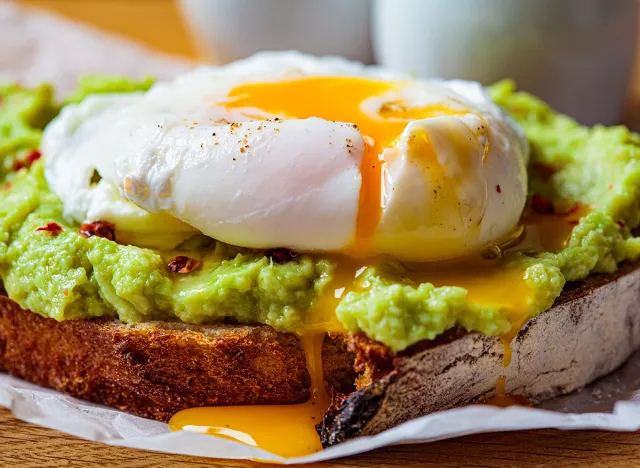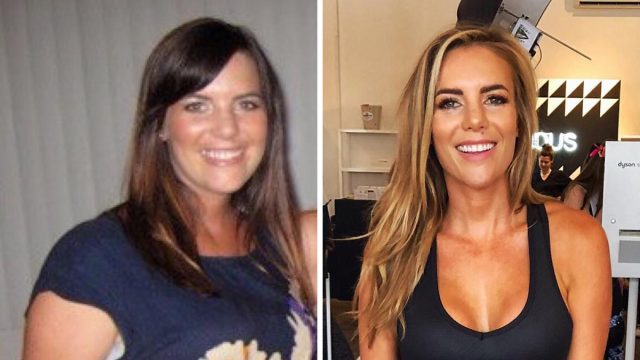I Lost 45 Pounds by Stopping These 5 Surprisingly Bad Habits
Katie Dunlop, CPT, CSN, and influencer (@lovesweatfitness) is an expert and influencer who has lost 45 pounds and totally transformed her body. On her various social media platforms, including YouTube, Instagram, and Facebook, she shares all her tips and tricks to getting into the best shape of her life. In one viral video, she reveals that a fundamental part of her weight loss had to do with ditching 5 bad habits. "When I was going through that journey, there were a lot of things I was doing to try to lose weight that later I realized were actually making me gain weight. And I guarantee you're doing at least one of these," she says in the video. We also asked The Diet Diva, Tara Collingwood, MS, RDN, CSSD, LD/N, ACSM-CPT, a Board Certified Sports Dietitian, to weigh in on her tactics.
Reduce Caffeine Intake
The first thing she started doing that had a huge impact on her losing weight? "I stopped ignoring the silent killer, and that silent killer is cortisol, which is our stress hormone," she explains, adding that cortisol increases when you have an increase in caffeine, "which blew my mind because all the diet pills I was taking, the coffee diets I was doing, all of that was about having more caffeine to try to lose weight," she says. "But when you increase your caffeine, it increases your cortisol. So my appetite was sped up and my metabolism slowed down and I ended up gaining way more weight." She strongly suggests not taking diet pills or amping up your caffeine intake if you are trying to lose weight. One way to do this is to switch to a half-caffeinated drink as it will "allow you to lose more weight." Or, she suggests just waiting until later in the day to have your coffee "because your cortisol is highest in the morning."Caffeine can be very dangerous, "especially for someone with undiagnosed underlying heart conditions," says Collingwood. "A cup or two of coffee is not a big deal, but when you add coffee and diet pills and pre-workout drinks and energy drinks, etc. it can add up to a whole lot of caffeine." She also agrees that caffeine raises cortisol levels, "which when chronically high can be dangerous."
Related: 9 Ways to Get 6-Pack Abs in 60 Days According to Science
Don't Skip Breakfast

The second thing she did was she stopped skipping breakfast. "This is something most women do when they're trying to lose weight. You think if you skip breakfast, you'll cut out some extra calories or you'll maybe just be able to wait a while and then you'll eat less throughout the day. But really when you skip breakfast, it actually makes you hungrier, it makes you make poor choices the rest of the day, and you end up gaining more weight," she maintains. She claims that when she started eating breakfast again, she saw "such better results" with weight loss. If you are busy in the morning she recommends meal prepping overnight oats, "so you have something healthy you can grab and go." She adds that when you eat breakfast, "it also helps lower those cortisol levels I was just talking about, so you're going to have an increase in your metabolism and see better results faster." Collingwood agrees about breakfast. "I have found in myself and in clients throughout the years that most people make up for the calories not eaten when they skip breakfast and then some," she says. "Some people lose weight initially when they skip breakfast but after a period of time the body adjusts by lowering metabolism and a plateau happens. Breakfast foods are typically high in nutrients so it is an excellent time to get whole grains, dairy, fruit, fiber rich foods, protein, and more."
Stop Demonizing All Sugar

The third thing Katie did was she stopped "demonizing" all sugar. "I used to be a sugar crazy person where I would read every single label and if it had even a gram of sugar, I wouldn't eat it. And that wasn't really the right approach either because that stressed me out and made me crazy," she said. It also led her "to eat a lot of sugar-free foods that had artificial sweeteners that can also slow down your metabolism," she admits. Now, she mostly pays attention to the added sugars in foods versus natural sugars "The daily recommended amount of added sugar is only 24 grams, but the average American eats 68 grams of added sugar a day. That's crazy," she points out. "So while I don't want us freaking out about counting every banana or apple we eat, it is really important that you pay attention to the added sugars in food because they add up so quickly and can completely destroy your weight loss goals."Some added sugar is absolutely fine, notes Collingwood, "and most health organizations recommend no more than 10% of your calories coming from added sugars," she says. "Natural sugars from fruit and milk have a lot of nutritional value associated with them and should not be counted when assessing sugar intake for the day. Added sugars also don't fill you up and are often in foods that have very little nutritional value."
Related: I Lost 10 Pounds in 50 Days with These 5 Changes
Stop Program Hopping

The fourth thing she stopped doing was "program hopping," she reveals. "When I was first trying to lose weight, I was always grasping at straws, trying to just find something that I thought would be a quick fix. Like, 'Oh, if I do this class, it's going to help me lose all this weight in a couple of weeks. Or if I do cardio for hours a day, I'm going to lose weight.' And when I didn't see results within a week or two, I would change to the next thing and the next thing," she explains, pointing out that the issue with this is that your body needs "consistency" to actually see results. "You're going to get the best changes and best results if you're consistent for at least two months. That doesn't mean you have to do the exact same workout every single day, but it means you need to have a consistent routine and program week after week for a minimum of two months to be able to see those results," she says.
Doing a variety of exercises like resistance training and aerobic (zone 2 steady state and some HIIT) "is good to work different muscles and work in different zones of intensity," says Collingwood. "That being said, going from workout to workout may not be good psychologically and when trying to establish a routine," she points out. "Pick a few different things you like to do and follow a weekly schedule. For example, run one day, go to a cycle class one day, swim laps one day, do yoga one day, and lift weights a few days a week."
Related: 7 Weight Loss Myths You Should NEVER Follow, According to Expert
Stop Trash Talking Yourself

The fifth and "truly, this made the biggest change" is that she "stopped trash talking" herself. "When you're in that place where you're feeling discouraged, you're feeling emotional, you don't like your physical body in the moment and the way that you've been treating it, it's really hard not to get down on yourself. It's hard not to beat yourself up. But what happens when you do that is you end up focusing on the person you were in the past, those behaviors that got you there, right? Maybe the overeating, that cycle of yo-yo dieting, and you focus too much on the past or maybe your current state, and that really does lead you to have more erratic weight loss," she says. "You're going to go really hard for a little bit and then you'll get discouraged again and you'll go really hard and you end up, yo-yoing, that's exactly what I did for years and years and years. So what you need to do instead is you need to focus on that version of yourself that you want to become."
Collingwood agrees. "Focusing on what your body is capable of is much more empowering than putting yourself down in front of the mirror or feeling bad when you can't keep up with someone else at the gym," she says. "Love yourself for your own abilities and don't compare yourself to others. Celebrate the small wins along the way. Celebrate the accomplishments and focus on how you are improving and getting stronger instead of putting yourself down."
💪🔥Body Booster: If you are a breakfast person, don't skip it. Experts say that even though you may be cutting calories by refraining from the meal, you will likely make it up – and then some – later in the day.





